Sept. 20, 2021 Launching on 9/21/21, autumn solstice, Agents of Influence kicks off new beginnings in edu gaming to combat misinformation. For over a year their team has stealthily brainstormed solutions, built momentum and tested efficacy among media literacy pros and educational communities to reveal an immersive, character driven spy game that uncovers the deeper inquiry and analysis needed to inoculate against media misinformation seeping into society every nanosecond.
3 Key Areas Exploring Misinformation
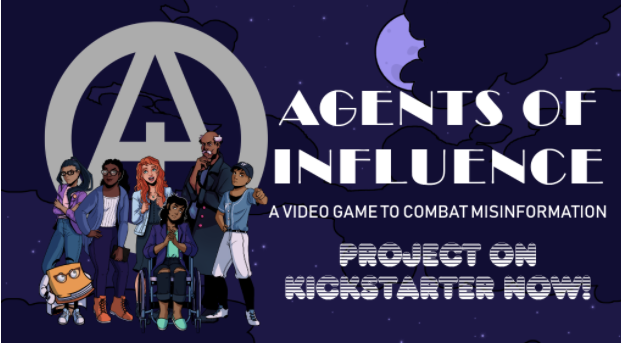
They’re focusing on conversations, analysis and research to impart some deep data nuggets into kids’ learning while tackling some pretty sophisticated manipulation and persuasion tenets that need awareness raised if not embedded deeply into student psyches with a circumspect ‘hmnnn.’
I’m notably excited about this storyline approach, layering the many facets of misinformation into relatable, middle school plot lines to achieve informal learning in an innovative, robust manner…though honestly, not as wild about the subhead descriptor “Cyber Danger” as that’s often kid code for ‘tune it out’…where kids cut to visions of hand-wringing adults. Perhaps that’ll get flushed in one of their future iterations of branding, as the games take shape fully and student voices amplify in the testing phase.
Meanwhile, just like my own new media/digital literacy book, Secret of the Vanishing Bones weaves mystery, detectives and intrigue into a way to ‘reach and teach inquiry’ through story narratives that stick, Agents of Influence embeds core disciplines, educating with hands-on choices and gaming mechanics that generate outcomes in a fun, fresh way and they’re using a fictional high school as the backdrop.
Why a game? Why Now? Why Misinformation?
These days, misinformation and DISinformation is altering our culture, dividing families and perpetuating propaganda at a speed where truth has been shape shifted into distortions upending lives, democracy and even our society itself.
Agents of Influence is taking a story style narrative and immersive approach with middle schoolers to target the breadth and depth of this massive media challenge, and I can’t think of a better “positive pick” to support in “more the merrier” mode to take on media misinformation. I spy…An edu game…with peel the onion layers of complexity about misinformation and messaging.
How will they carve out their niche among middle school educators who are desperately seeking learning tools to combat the scourge of social media ‘sharing’ sans facts and information literacy?
Today, Jasper McEvoy, Chief Strategy Officer of Alterea, the experiential design company that created Agents of Influence, answers some of my core questions.
Amy Jussel, Shaping Youth: With several ed tech games focusing on misinformation lately (like Harmony Square, Factitious, iReporter, etc) how do you see your new game fitting into the mix for middle schoolers in terms of the school day and timeline? (e.g. Is it more of a free play indie learning module or few minutes a day allocation or after school enrichment or ?)
McEvoy, Agents of Influence: The key differences between these games and Agents of Influence: Cyber Danger are depth, flexibility, and narrative.
Agents of Influence has 2.5 hours of content broken into 30-minute playable episodes, as opposed to 15-30 minute total playtime for these other games. The middle school education market is a tough one to enter, and something we learned early on was to design with flexibility in mind.
The full version of Agents of Influence will include a practice room, where students can get concentrated repetitions on core skills, interactive mini-lessons, and classroom content (teacher guides, discussion questions, etc.) for ease of use. All of these features are meant to meet the needs of a wide range of users, but what makes us entirely unlike all other game options that exist at the moment is the intriguing spy narrative and the world and characters we’ve built around it.
Shaping Youth: Can you speak to research showing the efficacy of using fiction to seed concepts that ensure learning sticks?
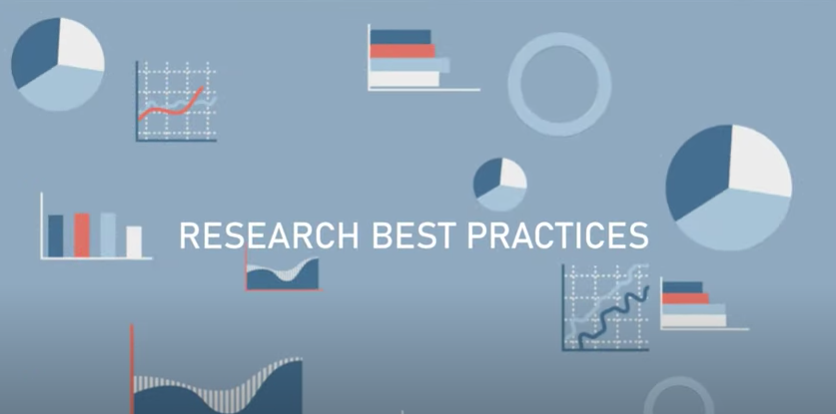 Agents of Influence: Sure, there are multiple factors involved in why transferable learning in games has proven to be so effective, for example:
Agents of Influence: Sure, there are multiple factors involved in why transferable learning in games has proven to be so effective, for example:
- The context of learning can be very much like the context of the application, so the transfer is easier. The goal is to create instruction that is directly applicable to how the content is used in the real world.
- We’ve placed the game in a familiar space: high school, exactly where our aspirational audience will be. We present misinformation in very similar contexts to where they will encounter it: conversations, specific content such as articles and videos, and social media.
- Studies also show feedback works best when it is specific (Hattie, 2007) and immediate (Opitz et al., 2011). Our game is a unique opportunity to achieve this. Because the game tracks user performance it can give feedback specific to certain actions, and because it’s a fully-programmed video game, that feedback can be delivered as soon as it’s relevant. Each of our games has a help feature that gives commentary and support based on player actions in a way meant to aid learning.
Agents of Influences Draws on Best Practices
- Transferable Learning
- Emotional Resonance
- Mastery Orientations
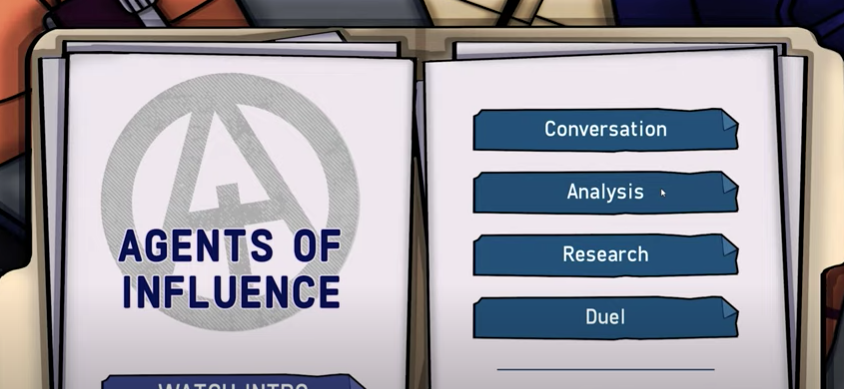 Here are some studies and articles on transferable learning that we’ve found helpful in explaining why this is the case. Also a few points on why stories are an effective educational method include emotional resonance (learners are more likely to remember information when it’s tied to a personal experience or an emotion, which describes our entire gaming experience) mastery orientations (which reinforces that when students pursue an activity because they want to learn and understand a topic, they perform much better than if they’re simply motivated to pass a class or get a good grade; our narrative invites and encourages inquiry rather than scoring mistakes and penalizing, etc.) and chunking which breaks learning into bite-sized to give students the chance to understand individual pieces and commit them to memory rather than loading them up all at once. Finally, we identified:
Here are some studies and articles on transferable learning that we’ve found helpful in explaining why this is the case. Also a few points on why stories are an effective educational method include emotional resonance (learners are more likely to remember information when it’s tied to a personal experience or an emotion, which describes our entire gaming experience) mastery orientations (which reinforces that when students pursue an activity because they want to learn and understand a topic, they perform much better than if they’re simply motivated to pass a class or get a good grade; our narrative invites and encourages inquiry rather than scoring mistakes and penalizing, etc.) and chunking which breaks learning into bite-sized to give students the chance to understand individual pieces and commit them to memory rather than loading them up all at once. Finally, we identified:
3 core skills related to absorbing misinformation
- Conversation/ social reinforcement
- Critical reading/analysis
- Research
Our first three games are built on these skills individually, allowing students to practice just those skills in a short amount of time. The final game, Finale Duels, puts the learning from the first three games together.
Shaping Youth: Is this an “academics only” type of ‘Games for Change’ educational endeavor or is there commercial potential here?
Who all is involved with this?
As the kids might say, “it’s a lot.”
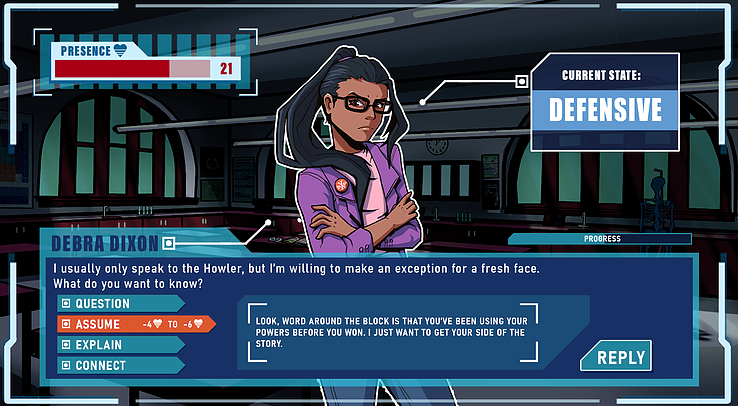 Agents of Influence: Alterea has a strong track record of creating experiences that empower participants to recognize that they have agency and the ability to make a difference in their real lives…the fact that we don’t come from a purely educational background is a huge advantage.
Agents of Influence: Alterea has a strong track record of creating experiences that empower participants to recognize that they have agency and the ability to make a difference in their real lives…the fact that we don’t come from a purely educational background is a huge advantage.
Most educational games look like interactive worksheets. We recognize that fun is the prerequisite of achieving the goal of a memorable, impactful, educational game and this is a front most educational games fail on.
We’ve built a strong team, including production partners Holy Cow Productions, media literacy advisor Renee Hobbs, educational games advisor Jesse Schell, and impact researchers Steve Schneider and Adam Berinsky. In addition, we are in touch with groups including NAMLE, IREX, Media Literacy Now, iCivics, and The Student View to promote the game.
Shaping Youth: Why you, why now?
And how did you choose the tough topic of misinformation which is a massive undertaking given our current era and media environment?
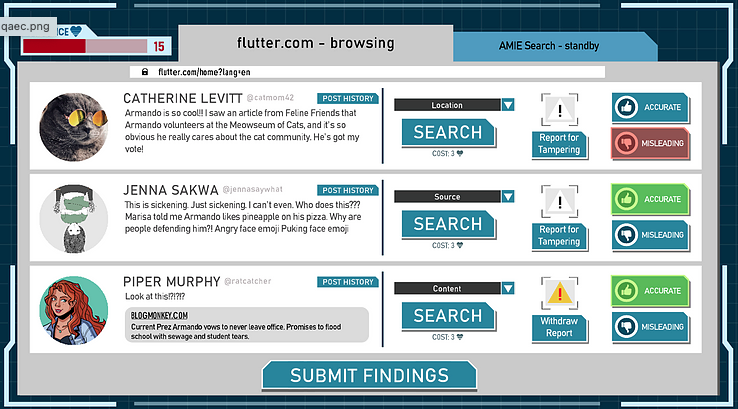 Agents of Influence: We realized that misinformation threatens those values that we hold so dear by manipulating and misleading people into taking actions and decisions that don’t align with their goals.
Agents of Influence: We realized that misinformation threatens those values that we hold so dear by manipulating and misleading people into taking actions and decisions that don’t align with their goals.
We all rely on information from mass media, social media, and digital media to make decisions in all aspects of life: social, economic, and political…but misinformation, which is largely spread through digital media, has become much worse in recent years, with touchstones like the COVID-19 pandemic and the former Trump presidency shifting and distorting factual truths.
In the 2016 election, it was found that the top “fake news” stories outperformed the top real ones on Facebook. The RAND center has conducted extensive research on the “truth decay” that has occurred before and during the era of “fake news”… And NewsGuard runs a COVID-19 misinformation tracking center, which lists 459 unique sites spreading misinformation about the pandemic. These are just a few examples of the problem often termed an “infodemic” that makes it hard to know what information to trust…our goal is to create usable solutions for students to use in the real world.
Shaping Youth: How will the learning be measured?
Did you conduct focus groups or end user testing to choose subject matter and create content?
 Agents of Influence: We have a database of over 150 educators and associates students who we reach out to for feedback in every stage of development so we’ve actively been getting input on everything from learning objectives to story to paper prototypes.
Agents of Influence: We have a database of over 150 educators and associates students who we reach out to for feedback in every stage of development so we’ve actively been getting input on everything from learning objectives to story to paper prototypes.
We haven’t had very extensive testing so far, but we’ve talked with hundreds of media literacy experts, teachers, parents, librarians, administrators, government officials, and game designers to wrap our heads around this issue and how best to solve it and we’ve also presented this project to Disney Imagineering Studios, Conejo Valley Rotary Club, the Media Education Lab, Enso Institute, Credibility Coalition, and the National Association of Media Literacy Education Conference.
Currently, we are conducting impact testing with partners Steve Schneider and Adam Berinsky to measure the learning. This will include before/after surveys with students and teachers, in-game data tracking, and a study of learning retention over time.
Shaping Youth: Do you see your fictional Agents of Influence game as totally different than current events curricula such as News Literacy Project’s Checkology or Cyber Civics or Common Sense Media’s digital literacy modules or view it as yet another tool in the arsenal to curb the chaos?
Agents of Influence: An educational game like Agents of Influence is not a replacement for curriculum like Checkology, Cyber Civics, Common Sense Media, or SHEG’s Civic Online Reasoning, rather, it is a supplement. The goal of such a product is not to comprehensively cover all aspects of a topic like misinformation, rather, it is to give students an opportunity to practice things they’ve learned through other approaches in an engaging environment and deliver some key takeaways to make it memorable. To best educate students (and teachers, and anyone else) on misinformation requires a combination of approaches and resources.
Shaping Youth: It’s frustrating to me that media literacy isn’t nationally mandated at this juncture throughout all grades, using every tool in the box across all disciplines…
Without inquiry and critical thinking, it’s easy to get derailed into misinformation moshpits that renders the notion of education itself questionable.
Media Literacy Now is doing massive work in getting legislation on the books toward universal media literacy instruction. Who do you feel is leading the way in this realm and at what age and stage?
Agents of Influence: As you know, media literacy education is NOT nationally mandated and we don’t know the exact number of schools that even offer the subject. Teachers by and large use standards such as Common Core or CASEL SEL to shape their yearly curriculum, so if something isn’t in standards it likely will not be widely taught.
Still, new media literacy and civics education laws are being implemented frequently and include places ranging from Florida to Massachusetts. One state that stands out is Illinois, which mandates civics education at a middle school and high school level and also often encompasses media literacy. (Amy’s Editorial Note: See how your state compares with this handy state by state Media Literacy Now graphic on legislative progress)
Shaping Youth: Thanks, Jasper for your time and good luck with the launch of Agents of Influence.
Parents and educators: You can do your part to support this Kickstarter by sharing their launch on social media, donating (or even sponsoring!) this positive, impactful project to take action on this key topic impacting ALL of our lives as we grapple with data dodging misinformation in these troubling times.
Help them out on your social media platform of choice…And visit their Kickstarter, below!
Agents of Influence Kickstarter runs for a month beginning Sept. 21, 2021
 More about Jasper McEvoy: As the Chief Strategy Officer of Alterea Inc., an experience design company that focuses on participant agency through live and digital mediums, he is co-lead on Alterea’s most recent project, Agents of Influence, an educational video game that teaches players to recognize and combat digital misinformation in their daily lives. He graduated from USC with a degree in Environmental Studies (B.S.) in 2019 and previously worked at Teachers’ Curriculum Institute as a middle school science content developer. His responses are compiled in association with Anahita Dalmia, co-founder and CEO of Alterea.
More about Jasper McEvoy: As the Chief Strategy Officer of Alterea Inc., an experience design company that focuses on participant agency through live and digital mediums, he is co-lead on Alterea’s most recent project, Agents of Influence, an educational video game that teaches players to recognize and combat digital misinformation in their daily lives. He graduated from USC with a degree in Environmental Studies (B.S.) in 2019 and previously worked at Teachers’ Curriculum Institute as a middle school science content developer. His responses are compiled in association with Anahita Dalmia, co-founder and CEO of Alterea.
More about Anahita Dalmia: Anahita has been designing immersive theatre experiences since including Ascend, an ancient mythology experience that was a finalist for the 2020 SXSW Innovation Awards and serves on the Board of Advisors for The Game Academy. She is a three-time published author on achieving social impact using experiential design and has been featured in multiple publications including Authority Magazine and ThriveGlobal.
Disclosure footnote: Though I don’t personally know this team, I ‘virtually met’ Anahita Dalmia through a Media Education Lab Zoom session and was duly impressed by the theme and ambition of this game.
As much as I wish I could fund it fully, I’m fiscally steeped in my own DigitalDogsBook.com media literacy series launch to seed informal learning at the K-5 level using storytelling as a narrative frame in kid lit…It’s quite obvious why I’m such a passionista on this project and am behind this and any other media literacy efforts 200%.
Also, as an addendum, I should add that about a decade ago, I tested a “CIA” (Cyber Information Advocates) undercover program for Shaping Youth, where middle schoolers entered virtual worlds to moderate, observe, and report back instances of cyberbullying or loopholes that needed closed for a safer, more productive online immersive experience, so I can attest to the excitement and thrill of this age appropriate level of sophistication when students are empowered to put the learning in their own hands.
For all the “What can one person DO about it” feelings of hopelessness in the misinformation media morass, Agents of Influence gives a variety of actionable, attainable answers as to how YOU can help quell infodemic chaos. As Fred Rogers would say, “Look for the Helpers…” This gaming team is clearly one of them, deserving a media literacy salute!









Speak Your Mind